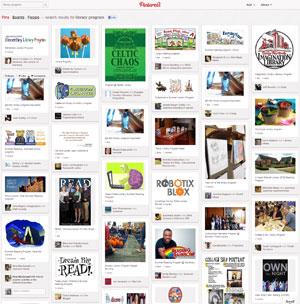If you’re a fan of arts and craft or recipe websites (or just spend ridiculous amounts of time wandering aimlessly around the internet, like myself), odds are that you’ve heard about Pinterest. If not, then you should definitely go explore. Be forewarned, though—you may look up hours later to find that the entire afternoon has inexplicably passed you by.
Pinterest is a social networking website that essentially allows a user to create themed digital bulletin boards and then fill them with “pins” of interesting items that you find online. The items can be anything—photography, blogs, websites, news stories, crafts, recipes, activities, etc. The social networking element comes in as you can “follow” other people’s board. Also, on the homepage, you can see pins that strangers and friends alike have placed on their boards. This feature is particularly handy for people like myself who would rather look for ideas in a single location (the Pinterest home page) rather than having to bounce all over the web.

“Why not just bookmark an interesting page?” one might ask. But the beauty of Pinterest is that you can organize your pins with the simple click of a button (pictures and descriptions included!), rather than having to create folders and subfolders in a Favorites list. Find some recipes, crafts, and kitchen décor ideas on a single foray? No problem—pinned onto “Delicious Treats,” “Crafty Creations,” and “Funky Furniture” within a matter of seconds.
I am sure by now that the majority of you have bridged the gap in figuring out how Pinterest can be used as a fabulous tool for library programming. With a simple search, you can instantly find hundreds of ideas that other Pinterest users have pinned on their boards. And even better, most of them have actually tried them out themselves, so that you know they’ll be successful!
A few months ago, we decided to have a Doctor Who program for the teens at the public library where I work. As an avid Whovian, I was delegated the task of finding crafts that were cool enough to grab a reluctant teenager’s interest. And even though Dr. Who fans are their own particular brand of geeky, I knew this was still going to be a tall order. So where did I turn? Pinterest, of course. A simple “Doctor Who” search within the site and I was presented with a variety of related pins. There were paper folding crafts (I now have a TARDIS and Dalek staring each other down across my desk), TARDIS Rice Krispies treat and Sonic Screwdriver–dipped pretzel recipes, and even Pin the Fez on the Doctor ideas. Needless to say, it was a smashing success.
I’ve also used Pinterest for Earth Day ideas, toddlertime rhymes, and for a wildly successful paper craft program, all of which have been filled with clever Pinterest craft ideas that I just wish I could have come up with myself! But that’s the beauty of the community. There seems to be a genuine desire to share ideas and promote such DIY activities. A simple journey from bulletin board to the original source’s comment section will prove how significant a pin can be, as traffic often dramatically increases and even more fabulous ideas are shared.
I’m working on the idea of using Pinterest to create digital boards of the paper bibliographies that we create for our themed weekly storytime programming as well as for our other general bibs. What a great way to prepare parents for book-seeking before they even enter our library! I’ve also read in various forums that many public libraries are embracing Pinterest as a way of organizing and promoting their Summer Reading Program events.
Of course, all good things have their own problems. Concerns have been raised about copyrights and permissions. Is Pinterest a Haven for Copyright Violations? is a great article that lays out the issues. But even if these concerns leave you hesitant to create an account, fear not, there still options. It is entirely possible to browse or search the site without an account, click on neat ideas, and follow their links back to the original source … all without pinning a thing.
So I urge you all to check it out. You just might find some genius ideas for programming that will keep your kids and teens coming back for more events!
